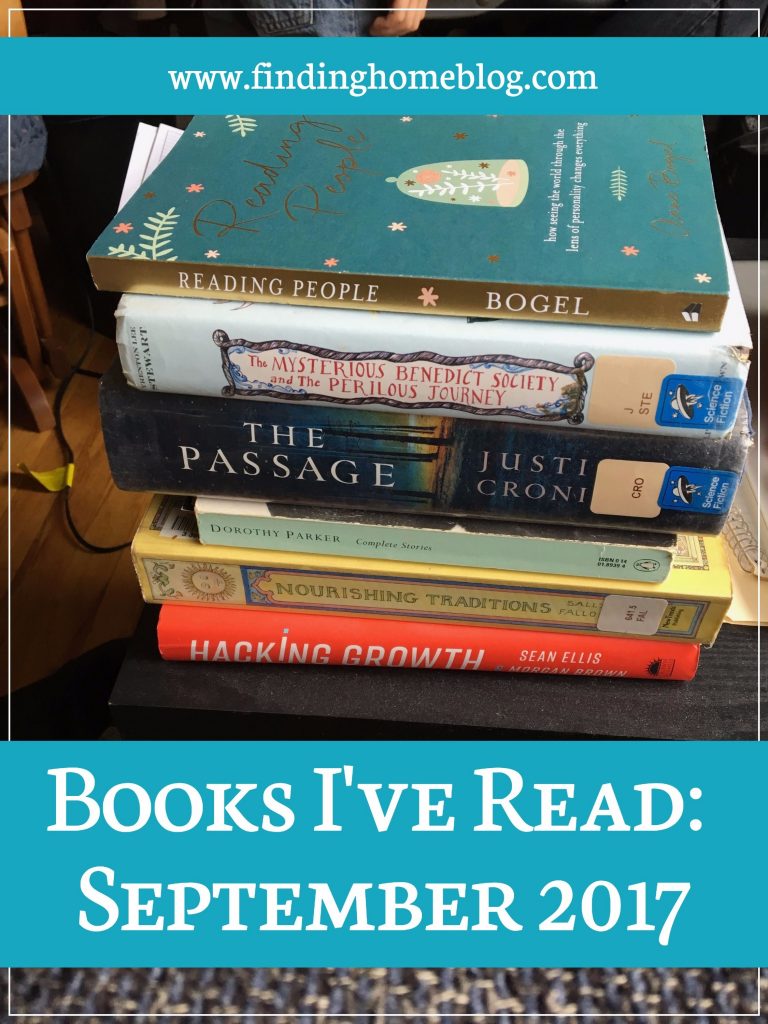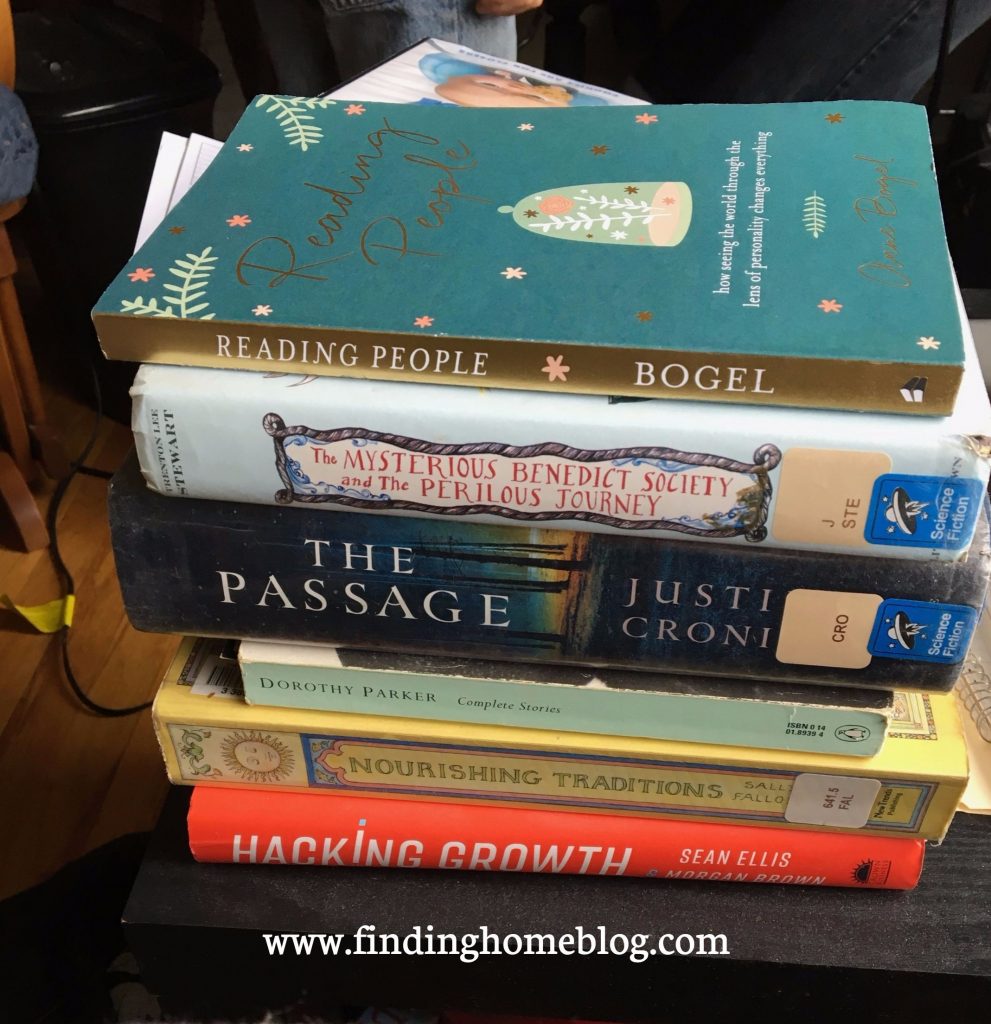September was a better month for my reading life than August, although I finished the same number of books. But one was really long, and I’m in the middle of several others.

The Passage by Justin Cronin. I borrowed this massive book from the library after hearing about it in a couple places within a few days. Once was on a podcast, and I think it showed up on some book list article as well? Anyways, the description intrigued me enough that I was willing to overlook the fact that one of the library categories included “vampires”, something I’m not into at all.
I almost gave up on this book after about 150 pages. It is really rare for me to stop reading a book midway. But I just could not get into the characters or the situations in the first part of the book.
It’s funny, actually, because most of the time my issue with dystopian fiction is that the situations or world the characters find themselves in are just not fleshed out enough. Not explained enough. Not given enough “smart-sounding descriptions” to make them believable.
The opposite is true with this book.
There was just too much of the “what happened to make the world the way it is”. Basically, I wanted to read what happened next. I love when people are thrown into unexpected situations, especially loss-of-electricity-or-technology situations, which is why this book appealed to me in the first place.
So somewhere in the middle of the story, there’s a shift to the future and a new set of characters. This is what prompted me to keep reading, because I was hoping for the “after”. In one sense, that’s what I got – there was a whole new way of life as a result of what happened in the first part of the book.
But it was still unresolved, and there were still vampires, and I still wasn’t a fan of most of the characters. Some of them even blended together in my head for awhile, because there was a big dump of a whole bunch of new faces all at once, and it took a little bit to sort out who was who.
By the end of the book, I actually did enjoy some of the characters, and I finished it satisfied that we were past most of the stuff I didn’t like, and that I could enjoy the next book (because it’s a trilogy, and all of them are 500+ pages, so plenty of potentially good stuff ahead).
And then I read the description for The Twelve, and instead of continuing where this one left off, apparently it jumps back to the original time of the first part of The Passage, only from the perspective of different characters, and then the third book in the series will actually get to the part I want to read, the aftermath of all this. Sigh. So I am undecided about continuing with this series.
Reading People: How Seeing The World Through The Lens Of Personality Changes Everything by Anne Bogel. I’m a longtime fan of Anne’s blog and podcast (which I was even on as part of a compilation show!), and I really enjoy personality frameworks, so grabbing this book with some of my birthday money was a natural choice.
If you’re a pop psychology fan, or you’re interested in personality frameworks, you’ll enjoy this book. Anne takes you through several different personality typing systems and explains not only a bit about what they are, but also how they’ve helped her in her life. So it’s a little bit memoirish in those parts too. And there are occasional references to book characters who exemplify the personality traits she’s talking about, which is extra fun.
I definitely enjoyed reading more about the frameworks that I have already typed myself in, but luckily that was most of them. And I had a lightbulb moment when I was reading the chapter about highly sensitive people, not because I discovered I am one (I’ve known that for awhile), but because I realized one of my children is very much an HSP as well, and there are certain instances that require a different type of parenting because of it. Realizations like this are the point of this book – by learning more about ourselves and our loved ones we can act accordingly, whether that’s playing to our strengths or working around our weaknesses.
About the only thing I didn’t like about this one was that there were end notes instead of foot notes. When someone references something, I want to know what it is, and sometimes dig deeper and go read it, so I did a lot of flipping back and forth to the end of the book. But maybe that’s just my personality…
The Wellness Mama Cookbook by Katie Wells. Do cookbooks count as books read? I say yes if you read all of the extras involved, which I did with this one. I had actually checked this out from the library, and then I bought this with birthday money as well.
This is a cookbook from the perspective of real food, grain free, but not a specific dietary type like paleo (although I think a lot of the recipes would fit there). We’ve tried several recipes already and they’ve been delicious! I’m in love with these coconut flour biscuits, which are also on Katie’s site, although the family had mixed reactions there. But we’ve had several yummy meals from this cookbook already.
Sometimes cooking out of a new cookbook is just what you need to get out of a cooking rut. (If that’s true for you too, check out my top 6 real food cookbooks and find something new for yourself, or grab this one)

I posted this picture of my current stack of books on my Instagram stories last week, and I’m still making my way through some of them. When I was younger, I’d read through multiple books at a time, and then I shifted to one at a time, but now I’m back to several. Because what I want to read depends on my mood and how much time or brain power I have!
And since that picture, I’ve taken two off the stack and added three more. Because there was a book sale at the library. So…yay books?
Do you read books one at a time or several at once?
Disclosure: Some of the links in this post are affiliate links. If you make a purchase through these links, I receive a bit of a commission at no additional charge to you. Thank you for your support!
Leave a Reply